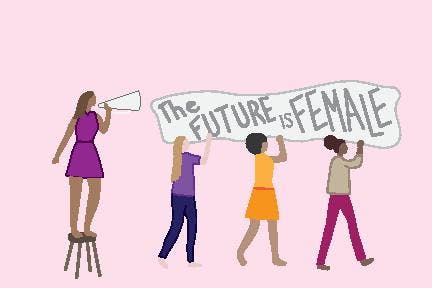Women have many accomplishments to be proud of this year. Vice President Kamala Harris became the first woman and woman of color to serve as vice president when she was sworn in Jan. 20.
There are 119 women serving in the House of Representatives, making up 27.4% of the total representatives. There are also 24 women in the Senate, out of 100 available seats.
Locally, women in the MSU and East Lansing area have made major strides for their rights over the past year while continuing to fight against sexual misconduct and gender inequality on campus.
Women issues on campus
Michigan State University has a diverse student body and faculty where women who identify as a minority race, ethnicity or religion, for example, face challenges that other women do not.
"When you put the issue of gender together with other things like race, ethnicity, nationality, the languages you speak and your position in society, etc., then the exclusion becomes more prevalent," Professor of Hispanic studies Rocío Quispe-Agnoli said. "That is one of the things that I have more promise with when it comes to any work I do ... is the fact that I want to be valued by what I actually offer independent from my gender, skin color, social affiliations, etc."
Women who encounter these challenges also include various leaders in student organizations on campus.
"There was definitely a shift in leadership," former Culturas de las Razas Unidas President Tammi Cervantes said. "When I would give (an) opinion, they were always shut down immediately. I knew how everything worked for years, and I would advise something it was shut down because one guy would say no and then the rest of the guys would say no."
These challenges extend to religious settings, like the MSU Hillel Jewish Student Center. However, over the years, the problems have decreased for some.
Rabbi Jenna Stein Turow, who works as the senior Jewish educator at MSU Hillel, said she faces less difficulties than women before here as a newer rabbi in her field.
"I will say there is still the concern, as there is with a lot of careers, that people expect me to get married and have children, and there's the concern that it will impact my career," Turow said. "I also find that there's the challenge of being represented, since historically women weren't rabbis; we're still kind of a minority, even though in the general population women are a majority. Related to this is the challenge of having my voice be heard and my interests represented, in rabbinic spaces."
Board of Trustees' checkered history
The MSU Board of Trustees currently is made up of six women and two men.
"We are really fortunate to have a majority-female Board, one that includes two women of color, and is led by a female chair," Trustee Renee Knake said. "We are also fortunate to have a President committed to women’s equality and a Provost who has devoted her career to the advancement of girls and women, in addition to being an inspiring leader herself."
While the Board of Trustees is majority women, members communicated that they still face many challenges due to their gender.
"In my past, I was an elected official in the state legislature for 16 years," Board Chair Dianne Byrum said. "I was the representative and the state senator for campus, but also when I was in legislature, I was the first woman to ever lead a caucus. ... What I saw (with) the dynamics and the differences between male and female representatives was really in a legislative context ... and it is still real difficult for women leaders."
These challenges go beyond the Michigan State community.
"Whatever sector you look at — politics, the corporate world, academics, medicine, the sciences and beyond — women do not hold positions of leadership and power in numbers equal to men," Knake said. "In my own field, law, women have entered legal education in numbers relatively equal to men for many years and yet they have not equally ascended to the judiciary, the general counsel’s office, the dean’s suite or similar leadership roles in the legal profession. Women are still paid less than men, and we know that women experience sexual harassment and discrimination in numbers greater than men."
Support student media!
Please consider donating to The State News and help fund the future of journalism.
Despite the women majority on the board, many gender-specific issues persist at Michigan State, including issues with sexual assault and the campus climate.
In 2018, ex-MSU and USA gymnastics doctor Larry Nassar was sentenced to 175 years in prison after decades of sexual abuse. Today, discoveries continue on who knew of Nassar's abuse and to what extent.
Additionally, the Board of Trustees refuse to release over 10,000 pages of documents from the internal investigation, claiming attorney-client privilege. These documents could help provide closure for survivors and allow them to move forward.
Many of the changes to Michigan State's sexual misconduct policies have been brought about due to the hard work of survivors, students and faculty after Nassar's conviction, not the board's willingness to be more transparent.
Other prominent issues with gender inequality centers around the pay gap.
According to a report by the Center for American Progress, an independent nonpartisan policy institute, white women make 79 cents for every dollar a white man makes. Black women only make 62 cents. Hispanic and Latino women make 54 cents, Indigenous women make 57 cents and Asian women make 90 cents.
Although the gap has decreased over the years, it is still displayed in a majority of work environments.
"I would say that being a woman, the only challenge I have ever really had professionally is around pay," Trustee Rema Vassar said. "I have gotten paid less than male counterparts several times consistently."
Looking to the future of women
Overall, there's admiration toward women role models who have inspired students to lead in their own roles.
Reed-Davis said that she looks up to Assistant Dean for Student Success Initiatives Genyne Royal because she wants to be like her in the next five to 10 years.
Faculty also look up to women role models. For example, Knake said she looks up to Deborah Rhode, the second female law professor granted tenure at Stanford Law School.
"Early in my career as an academic, which began at Michigan State, she came to campus to give a faculty talk about her latest book, The Beauty Bias,” Knake said. “From that moment on, she became a tremendous mentor, including hosting me when I spent a semester at Stanford Law School on my sabbatical and writing to support my tenure and promotions. In recent years, she also became a treasured friend. She passed away in January of this year, but her wisdom and quick wit still sticks in my head."
Though there are problems within MSU's culture that still need to be fixed, the university works to uplift women's voices.
"Michigan State is doing a good job of highlighting women faculty and picking really strong women in our roles across the campus," Vassar said. "I see every day in the news briefings that women are being showcased and highlighted, so I would really want MSU to continue to hire, promote but then also advertise the great work of the women who are Spartans."
There are various events happening on campus throughout the month to celebrate empowered women leaders both at MSU and across the nation, including a live and virtual film festival (LunaFest), numerous virtual speakers, Women's Council Pro-Choice Rally and more. The link to access information on university-led events can be found here.
This article is part of our Women's History Month print edition. Read the full issue here.
Discussion
Share and discuss “Women in leadership pave the way for future generations ” on social media.







